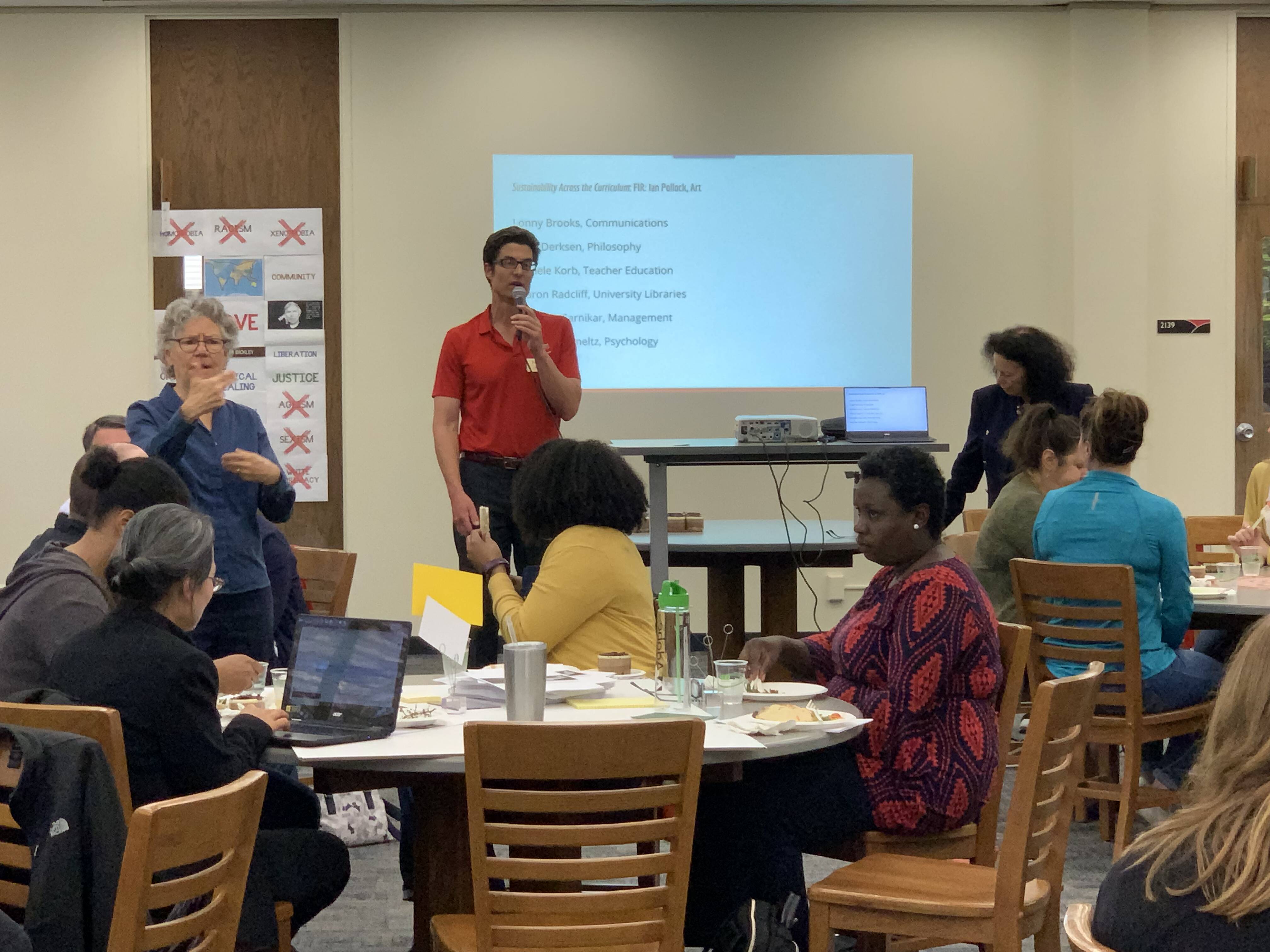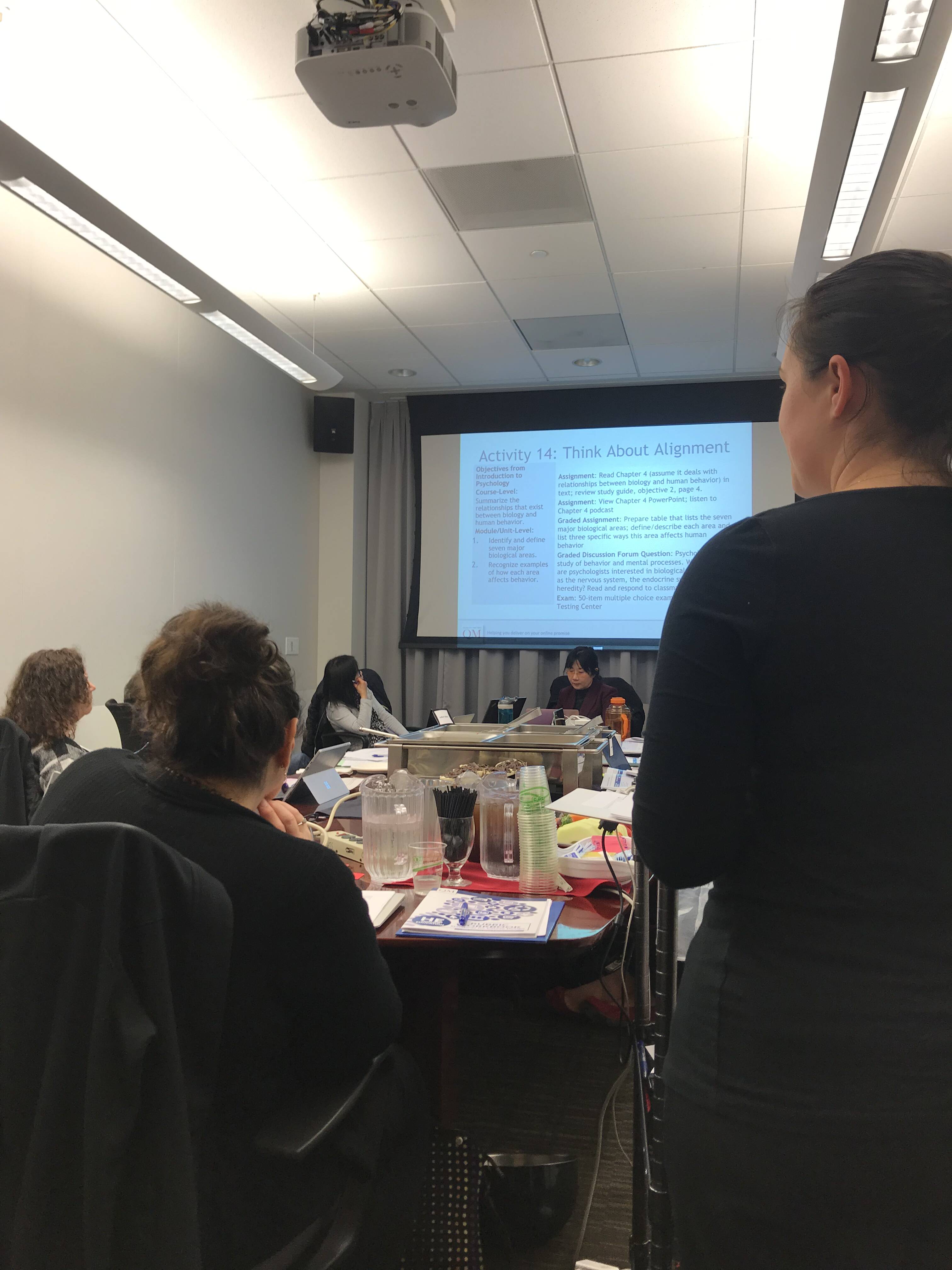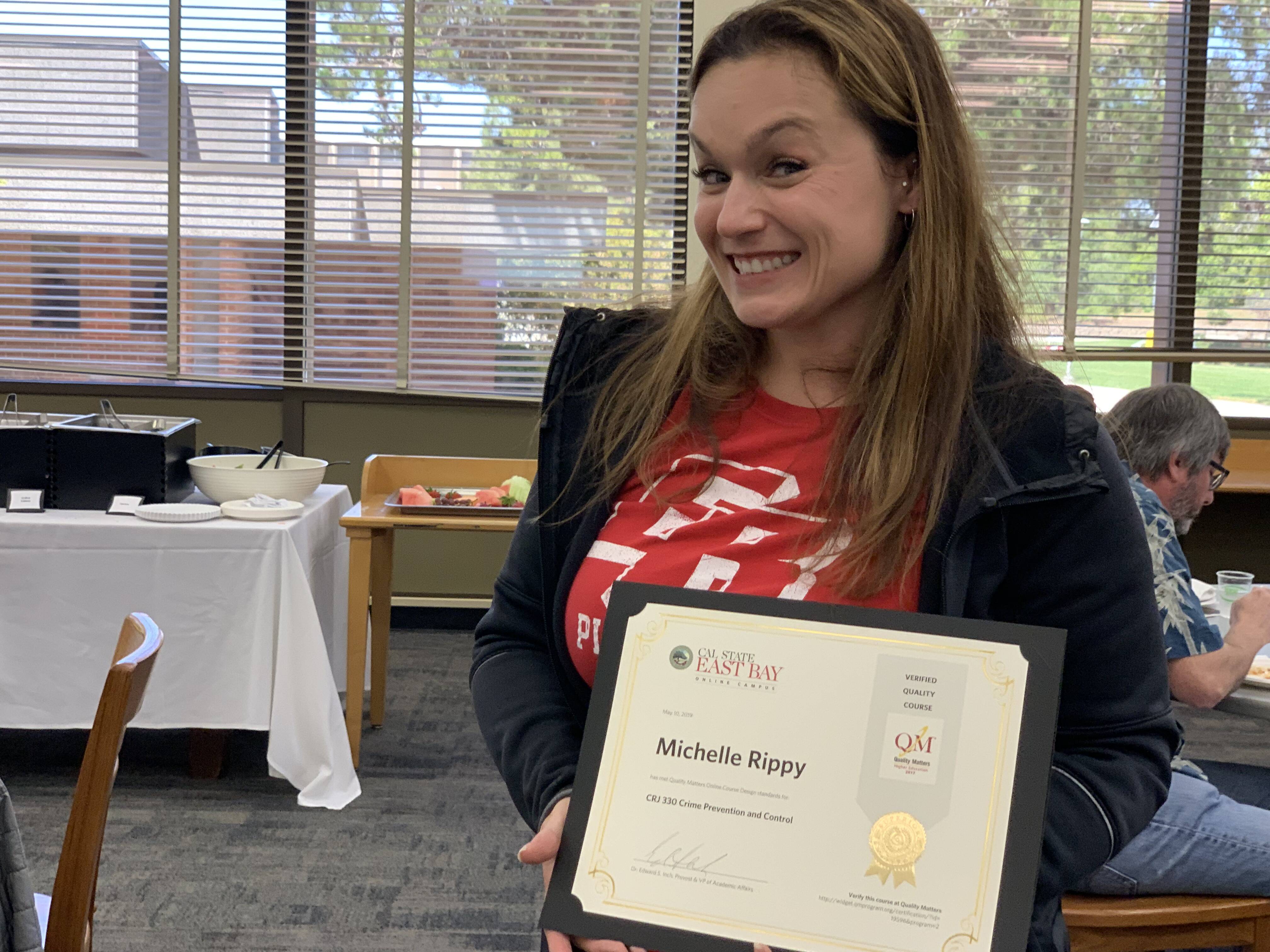2018-2019 — Cal State East Bay— Establishing a Culture of Quality Assurance
2018-2019 — Cal State East Bay— Establishing a Culture of Quality Assurance
Proposal Summary: Cal State East Bay proposed to increase the number of faculty trained in QA and the number of QM certified courses. Implementation of this proposal involved one-on-one Instructional Designer-Faculty relationships and a concentrated effort to provide training. Assessment of this proposal included a qualitative study of faculty feedback in preparation/design, teaching, and students’ learning. Other indicators of student success such as affordability of course materials will also be tracked.
Campus Goal for Quality Assurance
The main focus of our proposal included:
Increase the number of faculty who have completed QM training courses
Increase the number of faculty who have completed the course re/design of their online or hybrid courses for semesters;
Increase the number of Certified High Quality courses;
Support the Student Quality Assurance Impact Research initiative with a SQUAIR Faculty Research Group that will recruit one faculty to assess QA impact on additional teaching and learning related topic at the campus level and disseminate best practices internally;
Support the Affordable Learning Solutions initiative by encouraging courses that are being redesigned to adopt OER
Continue to improve accessibility for online learners with disabilities
Maintain support for professional development of faculty participating in the Quality Assurance programming.
With support from the Online Campus, CSUEB’s course design strategy utilizes Instructional Designers / eLearning Specialists by pairing them by program and faculty to provide the following services: offering OER resources, designing quality courses that meet QM standards, and incorporating the latest innovation and design pedagogy. The Development of these and other course resources will rely partially on QA funding and the rest will be covered by CSUEB matching funds.
We met our proposal goals the following ways:
We had 14 faculty complete APPQMR training and 19 faculty complete IYOC training this 2018-2019 academic year.
26 courses received QM certification which is almost double the goal of 15 that we had in our proposal.
The SQUAIR faculty associate completed a qualitative analysis of how QA trainings have helped with their online course design and has benefitted students and their teaching.
We saved students over $100,000 in learning material costs with support from AL$ funding and the support of the Library.
We offered 3 accessibility workshops for faculty to learn how to make their documents accessible for all learners.
The Faculty Development office hosted an FLC for Teaching with Technology. In this FLC, they surveyed students about helpful technologies, ways to incorporate communication and becoming more acquainted with different teaching technologies. These were useful experiences that the participating faculty in the FLC will carry over into their future coursework.
Quality Assurance Lead(s)
Jessica Weiss, Director of Faculty Development
Roger Wen, Senior Director of the Online Campus
Supporting Campus Partners
Provost and Associate Provost, Academic Affairs
The Online Campus Instructional Designer, eLearning Specialists, and LMS Administrators/User Support Consultants
Office of Faculty Development/Faculty Center for Excellence in Teaching
Media and Technology Services
Library
Campus Commitment Toward Sustainability of QA Efforts
The Development of courses that offer OER resources, meet QM standards and incorporate latest innovation and design pedagogy will rely partially on QA funding and the rest will be covered by CSUEB matching funds.
CSUEB will use matching funding to pay for the additional IYOC/APPQMR facilitation fees,APPQMR/IYOC trainings and other workshops in QA and design-related topics, and workshop panels comprised of former grantees with certified courses will disseminate information about the QA program and the opportunities for other faculty members and an FLC will support the process of peer review of online courses.
Summary of Previous QA Accomplishments
Since Summer 2014, East Bay has engaged in a number of efforts focused on QOLT, QM, and Quality Assurance programming, training, and support that contributed to the success of our 2017-18 efforts.
Prior Accomplishments Include:
- Total 92 courses certified as high quality courses by QM and QLT
- Assessment results: The combined 2016-2017 and 2017-2018 efforts are paying off. When we compared courses taught by QA-participating faculty between Summer 2014 and Summer 2017, the percentage of DWFs in online courses taught by faculty who participated in QA activities [9.60%] is significantly lower than that in courses taught by faculty who have not participated in QA activities [10.47%]. [F(1, 3261)=4.162, p=.041]. We anticipate that the courses taught by participating faculty in the remainder of 2017-2018 as well as 2018-2019 will show similar declines.
- 2016-2017 Online and Hybrid Course Quality Transformation Grant Program (QA)
- 2015-2016 Online and Hybrid Course Quality Transformation Grant Program (QA)
- 2015-2016 Revising Your Online Courses for Semester Conversion Faculty Learning Community
- 2014-2015 Online and Hybrid Course Quality Transformation Grant Program (QA)
- 2014-2015 Teaching with Technology Faculty Learning Community
- 2014: Summer Institute: Journey to Excellence in Online Education (QOLT introduced)
- 2015-2016 QOLT Campus Nominee, Kevin Kaatz, Department of History
- 2015 College Coordinators for Quality Assurance Faculty Learning Community (QM-based)
- 2014-2015 QOLT Awardee, Kevin Kaatz, Department of History

John Wenzler, Dean of University Libraries, summarizing ALS/OER efforts on campus and resources available for faculty interested in redesigning courses during the May '19 Spring Celebration of Teaching held in collaboration with the Library, the Online Campus, and the Office of Faculty Development/Faculty Center for Excellence in Teaching.
Dissemination of QA Efforts— Conferences
List the conference(s) attended, who attended, and the link to the presentation — National, Regional, State or Local
QM National Conference 2018, Dr. Roger Wen, Monica Munoz, Cheryl Saelee, Link to presentation
Western Association of Criminal Justice Annual Conference, Cheryl Saelee, Michelle Rippy, Link to presentation
DETCHE Annual Meeting 2018, Dr. Roger Wen, Monica Munoz, Cheryl Saelee, Link to presentation
OLC Accelerate National Conference 2018, Monica Munoz, Link to presentation
OLC Innovate Conference 2019, Monica Munoz, Link to presentation

Dr. Roger Wen, Cheryl Saelee and Monica Munoz presenting at the QM National Conference in St. Louis, MO 2018.
Training Completions
The following table summarizes all Cal State East Bay faculty and staff that have taken QA training during the 2018-2019 academic year.
Training | Number of Completions |
Applying the Quality Matters Rubric | 14 |
Applying the Quality Matters Rubric Face-to-Face and Online Facilitator | 1 |
Improving Your Online Course | 19 |
Master Reviewer Recertification | 2 |
Improving Your Online Course Online Facilitator | 1 |

Senior eLearning Specialist delivers APPQMR training in March 2019.
Course Peer Review and Course Certifications
Each faculty member is paired with an eLearning Specialist/Instructional Designer and they work together to get the course ready for review. The eLearning Specialist/Instructional Designer conducts a self-review of all courses before they are submitted to QM.
At Cal State East Bay, there are currently 13 eligible QM Peer reviewers:
- Georgie Ziff
- Chinglih Jan
- Andrew Wong
- Michelle Rippy
- Li-Ling Chen
- Erick Kong
- Anne Guptill
- Bill Hopkinson
- James Mitchell
- Kimberly Kim
- Kevin Kaatz (Master Reviewer)
- Roger Wen (Master Reviewer)
- Isaiah Lankham
The table below shows Quality Matters Certified courses for 2018-2019 Academic Year.
Course ID | Course Name | Instructor |
CRJ340 | Advanced Criminal Investigation (05/2019/QM) | Michelle Rippy |
ACCT215 | Introduction to Managerial Accounting (05/2019/QM) | Robert Lin |
ENGL302 | Discursive Writing | Marina Sapozhnikov |
KIN461 | Exercise and Well Being (03/2019/QM) | Huda Prucha |
ANTH300 | Anthropology in Global Change (03/2019/QM) | Lisa Handwerker |
FIN410 | Problems in Corporate Finance (03/2019/QM) | Tammie Mosley |
POSC801 | Legal Research and Writing I (03/2019/QM) | Michael Greathouse |
OTL680 | Building The Online Environment (02/2019/QM) | Anne Guptill |
EDUI680 | Current Technologies (02/2019/QM) | Li-Ling Chen |
MLL146 | Basic Spanish for Health Care Professionals (01/2019/QM) | Maria Del Thomas |
KIN162 | Nutrition and Performance (11/2018/QM) | Huda Prucha |
CRJA2500 | Administration of Justice(09/2018/QM) | Summer Jackson |
TED529 | Professional Responsibilities in Education (10/2018/QM) | James Mitchell |
BAN602 | Quantitative Fundamentals for Analytics (10/2018/QM) | Chongqi Wu |
ENGL300 | Writing for Proficiency (12/2017/QM) | Patricia Raburn |
CMGT6999 | Issues in Construction Management (08/2018/QM) | Reza Akhavian |
OTL605 | Educational Planning and Development for Online Programs (08/2018/QM) | Witt Salley |
EDLD620 | School Finance and Human Resources for Equity (08/2018/QM) | Michael Fanning |
REC364 | RT program Planning and Implementation (08/2018/QM) | Keelin Jardin |
ANTH3720 | Medical Anthropology (08/2018/QM) | Lisa Handwerker |
CRJ330 | Crime Prevention and Control (08/2018/QM) | Michelle Rippy |
POSC825 | Law Office Management (08/2018/QM) | Betty Cavanaugh |
NURS452 | Preceptorship Synthesis (07/2018/QM) | Kimberly Kim |
MGMT3110 | Project Management (07/2018/QM) | Vish Hegde |
REC362 | RT: Documentation and Assessment (07/2018/QM) | Erick Kong |
MGMT3560 | Business and Professional Ethics (07/2018/QM) | Rajan Selvarajan |

Michelle Rippy, CRJA, shares here QM certificate, awards at the Spring Celebration of Teaching, May 2019, an event with over 70 attendees open to the campus community.
Student Quality Assurance Impact Research
Dr. Kevin Kaatz from Cal State East Bay conducted the study and wrote a white paper for the 2018-2019 SQUAIR project. The research question (as approved by the IRB) was:
“How has our quality assurance training (either through QM, QOLT, or OLC) helped with your course (online, hybrid, and/or in-class) in the following areas ( Preparation/Design, Teaching, and Students’ Learning)? Please be specific as possible, provide examples, and/or provide students’ feedback.”
This question was sent out to 198 faculty that had taken some type of QA training. 26 faculty responded, giving us a response rate of 13%. 96% of the faculty stated that the training they received was very helpful/helpful. Only one person (4%) was not sure if it was useful. None of the faculty stated that it was unhelpful. The faculty comments were coded into a Positive category with 6 sub-categories. The 6 sub categories were course organization, alignment, accessibility, benefits to students, further use of rubrics and eLearning Specialists.
Course Organization: 11 faculty mentioned this and was the most popular response to the research question, “How did our QA training help with...your courses…”
Alignment: 6 faculty mentioned this as being helpful in designing online courses.
Accessibility: 4 faculty mentioned this category. With the QM rubric now requiring accessibility to be met, faculty have to build this into their course.
Student Benefits: 4 faculty mentioned that students benefited from making courses more engaging and students recognized that the course was more organized than other online courses.
The Use of Other Rubrics: 2 faculty mentioned that they now use rubrics as part of their online course due to QA training.
eLearning Specialists: 2 faculty mentioned this category and one stated “It has been useful to work with the QM team and have another set of eyes to have my course met National QM standards.”
Overall, faculty found the QA training helpful and a few commented that the QM rubric should be made available to students and that the QA training should be offered to those who teach in-class courses.
Development of Campus QA Resources
Upload video, images, links to resources developed.
Acquired a copy of iSpring
Additional SoftChalk licenses
Additional GI2025 funding to support QA effort
Regular faculty workshops on course design related topics
Accessibility/UDL Efforts
Launched ALLY in all Blackboard courses
Purchased ABBYY and Grackle docs to help assist in increasing the accessibility of document in Blackboard
Offer Accessibility training workshops to campus community in an effort to establish an inclusive campus community
Next Steps for QA Efforts
We plan to identify and certified 5 more online or hybrid courses in 2019-2020.
10 faculty will complete APPQMR or IYOC
Seek additional funding to elevate the progress
